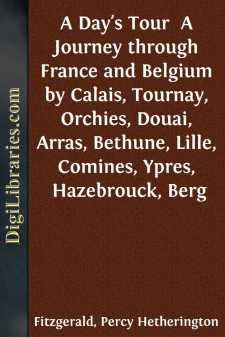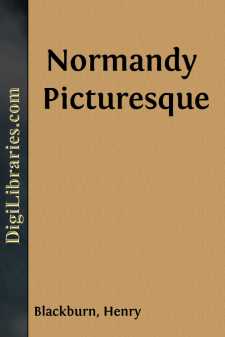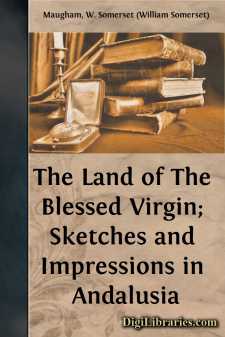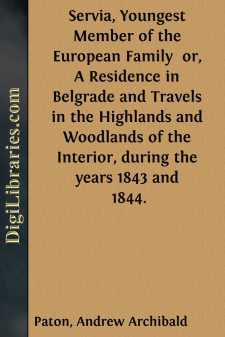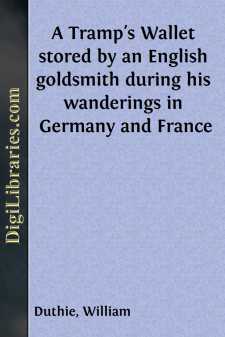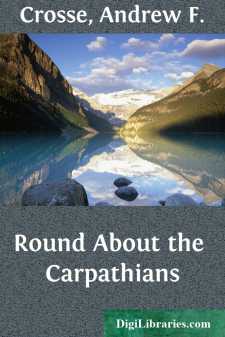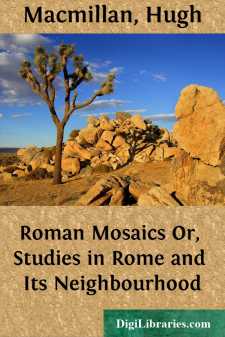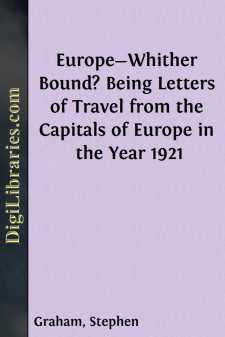Travel
- Africa 29
- Alaska 3
- Asia 46
- Australia & Oceania 26
- Canada 31
- Caribbean & West Indies 5
- Central America 1
- Europe
- General 39
- Maps & Road Atlases 1
- Mexico 10
- Middle East 18
- Polar Regions 7
- Reference 11
- Restaurants 1
- Russia 6
- South America 16
- United States 71
Europe Books
Sort by:
IN TOWN. t is London, of a bright sultry August day, when the flags seem scorching to the feet, and the sun beats down fiercely. It has yet a certain inviting attraction. There is a general air of bustle, and the provincial, trundled along in his cab, his trunks over his head, looks out with a certain awe and sense of delight, noting, as he skirts the Park, the gay colours glistening among the dusty...
more...
by:
Henry Blackburn
CHAPTER I. ON THE WING. It is, perhaps, rather a subject for reproach to English people that the swallows and butterflies of our social system are too apt to forsake their native woods and glens in the summer months, and to fly to 'the Continent' for recreation and change of scene; whilst poets tell us, with eloquent truth, that there is a music in the branches of England's trees, and a...
more...
After one has left a country it is interesting to collect together the emotions it has given in an effort to define its particular character. And with Andalusia the attempt is especially fascinating, for it is a land of contrasts in which work upon one another, diversely, a hundred influences. In London now, as I write, the rain of an English April pours down; the sky is leaden and cold, the houses in...
more...
CHAP. I. I had long been desirous of visiting the Continent, but the long continuance of the war, and the little prospect which lately appeared of its termination, seemed to afford no chance for the accomplishment of my wish. At a period, however, when that arbitrary power, which had so long held in subjection the other nations of the Continent, sought to overthrow the only monarch who dared to oppose...
more...
CHAPTER I.Leave Beyrout.—Camp afloat.—Rhodes.—The shores of the Mediterranean suitable for the cultivation of the arts.—A Moslem of the new school.—American Presbyterian clergyman.—A Mexican senator.—A sermon for sailors.—Smyrna.—Buyukdéré.—Sir Stratford Canning.—Embark for Bulgaria. I have been four years in the East, and feel that I have had quite enough of it for the...
more...
by:
William Duthie
PREFACE. During a stay of three years and a half in Germany and France, sometimes at work, sometimes tramping through the country, the Author collected a number of facts and stray notes, which he has endeavoured in these pages to present to the public in a readable shape. Of the twenty-eight chapters contained in the volume, sixteen originally appeared in “Household Words.” They are entitled The...
more...
by:
Andrew F. Crosse
CHAPTER I. Down the Danube from Buda-Pest—Amusements on board the steamer—Basiash—Drive to Oravicza by Weisskirchen—Ladies of Oravicza—Gipsy music—Finding an old schoolfellow—The czardas. One glorious morning in June 1875, I, with the true holiday feeling at heart, for the world was all before me, stepped on board the Rustchuk steamer at Buda-Pest, intending to go down the Danube as far...
more...
by:
Hugh Macmillan
CHAPTER I A WALK TO CHURCH IN ROME I know nothing more delightful than a walk to a country church on a fine day at the end of summer. All the lovely promises of spring have been fulfilled; the woods are clothed with their darkest foliage, and not another leaflet is to come anywhere. The lingering plumes of the meadow-sweet in the fields, and the golden trumpets of the wild honeysuckle in the hedges,...
more...
by:
Stephen Graham
LETTERS OF TRAVEL I. FROM ATHENS Europe, whither goest thou?—the poignant question of to-day. The pride of Christian culture, the greatest human achievement in history, with, as we thought before 1914, the seal of immortality set upon her, is now perhaps moving towards dissolution and death. Europe has begun a rapid decline, though no one dares to think that she will continue in it downward until she...
more...
by:
Mark Twain
CHAPTER XXI. We voyaged by steamer down the Lago di Lecco, through wild mountain scenery, and by hamlets and villas, and disembarked at the town of Lecco. They said it was two hours, by carriage to the ancient city of Bergamo, and that we would arrive there in good season for the railway train. We got an open barouche and a wild, boisterous driver, and set out. It was delightful. We had a fast team and...
more...


